Technology-savvy entrepreneurs from Taiwan help not only strengthen Taiwan’s economic power with their endeavors, but also flank the nation’s diplomatic thrust and enhance the reservoir of sympathies for it.
The recently held Concordia Summit 2022 in New York, with the participation of many high-profiled international figures from politics to finance, culture to environmental protection and human rights, was attended by a number of Taiwanese officials and businesspeople. Indeed, the summit, timed to coincide with the UN General Assembly, is being touted as a “mini United Nations.”
Taiwan’s uncontested global leadership in the electronics field, particularly in chip manufacturing, was noted at the summit where President Tsai, Ing-wen (蔡英文), in a recorded message, thanked organizers for staging the summit, and discussed Taiwan’s development.
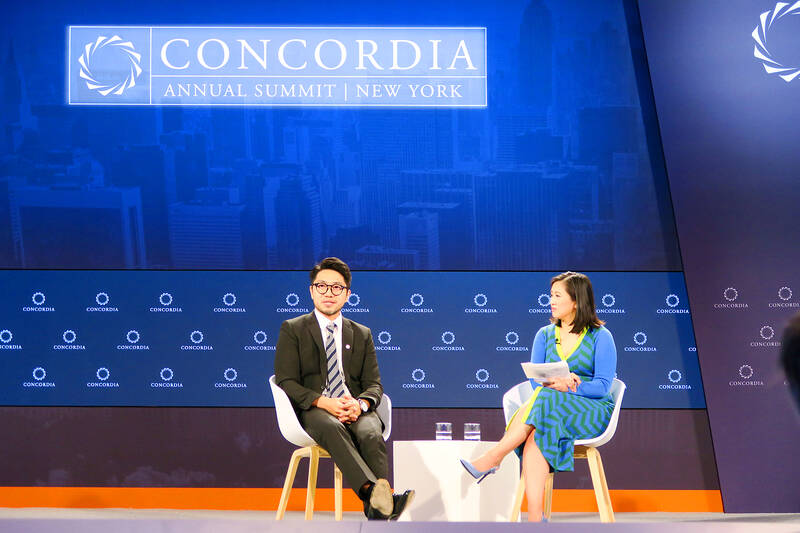
Photo: CNA
A striking feature about Tsai’s virtual presence was that she was listed as President of the Republic of China (Taiwan), in contrast to certain UN-affiliated organizations, which usually describe Taiwan as “Chinese Taipei.”
HUMANITARIAN AID
Alex Shyy (史立軍), Deputy Secretary General of Taiwan’s International Cooperation and Development Fund (ICDF), said that Taiwan provides a wide range of technological assistance to developing countries, though “it is driven mainly by humanitarian considerations.”
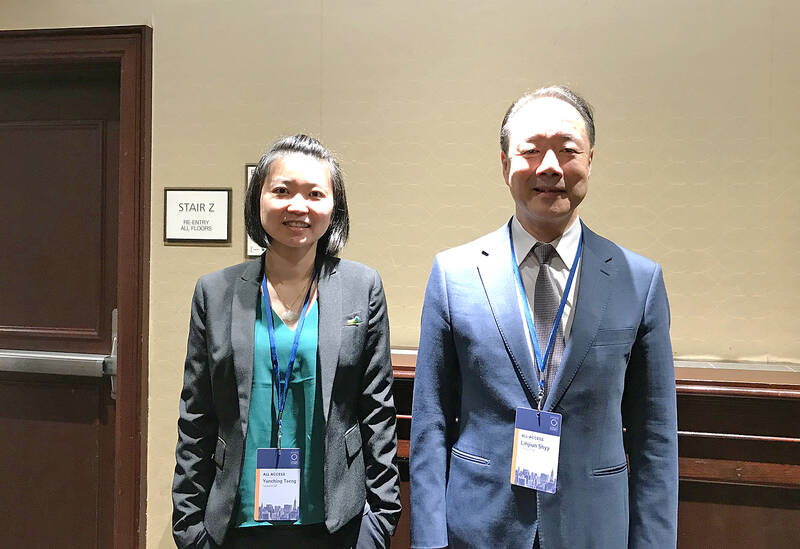
Photo: Manik Mehta
“We provide soft loans, technology, education, vocational training, humanitarian aid … these are the key elements of our aid program,” he told the Taipei Times.
Extending such assistance poses a sharp contrast to China’s commercial loans for projects in developing countries that get caught in Beijing’s debt trap and end up mortgaging their strategic assets as a surety for their inability to repay the loans, which recently happened in Sri Lanka.
The ICDF is active in Central and South America, the Caribbean and Pacific islands, Southeast Asia and West Asia Africa. This form of assistance is welcomed by many countries that are known to have disappointing experiences with China.
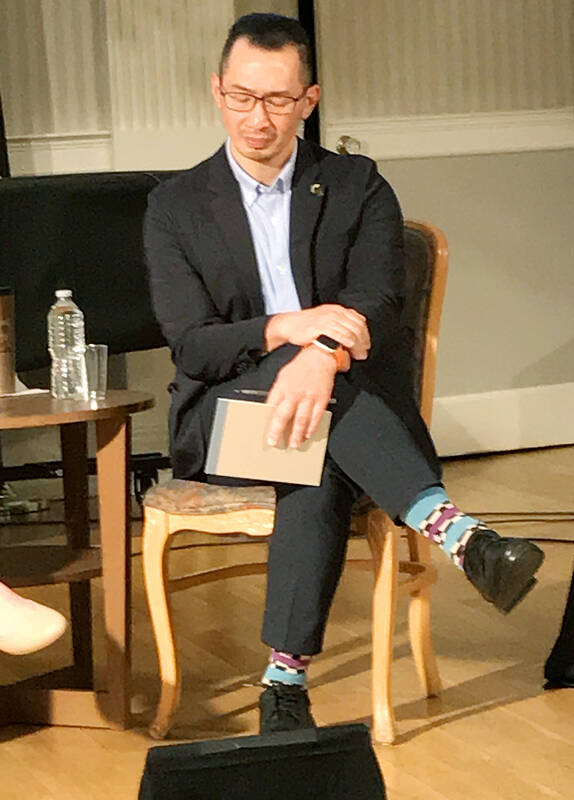
Photo: Manik Mehta
Shyy said that ICDF works closely with the European Bank for Reconstruction and Development and provides special funds to it to implement projects in Romania, Bulgaria, Uzbekistan and Moldovia.
“Our loans are given at very low interest rates as per OECD regulations. We have strategic partnership with USAID. We are here at the Concordia Summit to create awareness about Taiwan and build partnerships with US agencies,” Shyy said.
Minister for Digital Issues Audrey Tang (唐鳳) highlighted Taiwan’s technological advancement, and its high level of innovations and sophistication. Taiwan’s techno-entrepreneurs, many of whom visited New York during the UN’s general assembly, were seen interacting with US businesspeople.
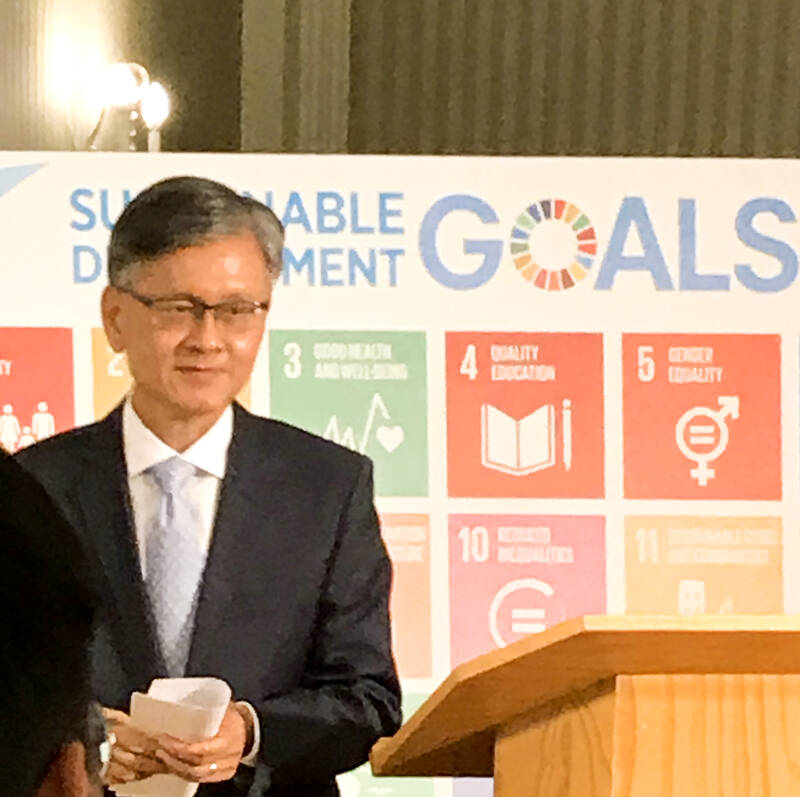
Photo: Manik Mehta
INNOVATION
Arthur Huang (黃謙智), CEO of Taipei-based Miniwiz Co, made a strong pitch for the recycling industry, whose aim is to reduce pollution and stop the depletion of resources in keeping with a key UN social development goal emphasizing conservation and engaging in responsible consumption and production.
“You can say that we convert trash into good, usable materials … [T]rash is precious and should not be wasted in the interest of our environment and our planet. I am wearing a suit that is made of used polyester propylene,” Huang said, pointing to his attire as he spoke with the Taipei Times.
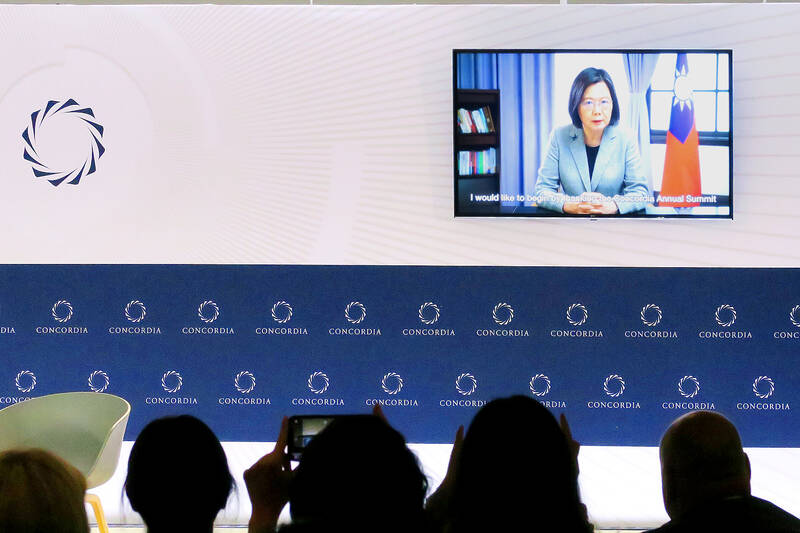
Photo: CNA
“Governments have tremendous power to play a role in the circular economy,” Huang added. “The perception of trash in the consumer mind is still negative and needs to change. The first step is to make people realize that it is possible to create things from trash,” he said.
Huang added that his company is targeting high-consumption industries such as textiles, plastics, steel and aluminum to reduce carbon emissions.
Another manifestation of the much-discussed “techno-entrerpreneurial diplomacy” was on display at another event, “Finding Transformative Solutions Through Innovative Partnership Mechanisms,” organized by the Taipei Economic and Cultural Office in New York, where a number of prominent speakers, including Minister of Foreign Affairs Joseph Wu (吳釗燮), conveyed their views by video conference.
Allen John Ku (樊亞倫), Vice President of Ever III & Partners, a Taiwan-based consulting firm focusing on the new economy, innovation and “bridging Taiwan to the world,” said his company designs and executes programs that enhance the innovation ecosystem and connect resources between regional stakeholders including startups, government agencies, multinational corporations, local businesses, adding that “our signature program” is the Taiwan Startup Stadium which helps Taiwan startups go global.
“We are the purveyors of the Startup Island Taiwan brand for the National Development Council of Taiwan,” he said.
Ku maintained that Taiwan, though officially not a UN member, was working for the realization of the UN’s 17 social development goals (SDGs), and had made good progress towards achieving the goals.
“The world has already started noticing Taiwan’s progress even though the majority of the nations have not made much progress,” Ku said.

Towering high above Taiwan’s capital city at 508 meters, Taipei 101 dominates the skyline. The earthquake-proof skyscraper of steel and glass has captured the imagination of professional rock climber Alex Honnold for more than a decade. Tomorrow morning, he will climb it in his signature free solo style — without ropes or protective equipment. And Netflix will broadcast it — live. The event’s announcement has drawn both excitement and trepidation, as well as some concerns over the ethical implications of attempting such a high-risk endeavor on live broadcast. Many have questioned Honnold’s desire to continues his free-solo climbs now that he’s a

As Taiwan’s second most populous city, Taichung looms large in the electoral map. Taiwanese political commentators describe it — along with neighboring Changhua County — as Taiwan’s “swing states” (搖擺州), which is a curious direct borrowing from American election terminology. In the early post-Martial Law era, Taichung was referred to as a “desert of democracy” because while the Democratic Progressive Party (DPP) was winning elections in the north and south, Taichung remained staunchly loyal to the Chinese Nationalist Party (KMT). That changed over time, but in both Changhua and Taichung, the DPP still suffers from a “one-term curse,” with the

Jan. 26 to Feb. 1 Nearly 90 years after it was last recorded, the Basay language was taught in a classroom for the first time in September last year. Over the following three months, students learned its sounds along with the customs and folktales of the Ketagalan people, who once spoke it across northern Taiwan. Although each Ketagalan settlement had its own language, Basay functioned as a common trade language. By the late 19th century, it had largely fallen out of daily use as speakers shifted to Hoklo (commonly known as Taiwanese), surviving only in fragments remembered by the elderly. In

Lines between cop and criminal get murky in Joe Carnahan’s The Rip, a crime thriller set across one foggy Miami night, starring Matt Damon and Ben Affleck. Damon and Affleck, of course, are so closely associated with Boston — most recently they produced the 2024 heist movie The Instigators there — that a detour to South Florida puts them, a little awkwardly, in an entirely different movie landscape. This is Miami Vice territory or Elmore Leonard Land, not Southie or The Town. In The Rip, they play Miami narcotics officers who come upon a cartel stash house that Lt. Dane Dumars (Damon)